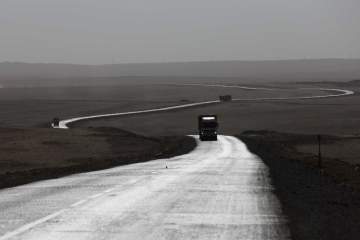Mongolian environmental activist
Tsetsegee Munkhbayar, who was
awarded the Goldman Environmental
Prize in 2007 for his campaign to
protect water sources from mining
pollution, was
sentenced on Jan. 21 together
with four associates to 21 years in
prison for “acts of terrorism.”
Munkhbayar was arrested on Sept. 16
when attending a protest during
which a firearm was discharged.
Security officials also
allegedly found an explosive
device in a nearby building.
While not condoning violence, the
Goldman Prize
states that “it is widely
understood that the shot was not
fired on purpose and nobody was
injured.”
Media reports referenced by Asia
Correspondent said that Munkhbayar
had brought a gun and inactive
grenades to the protest.
The website spoke to Enkhbat Toochog
of the U.S.-based Southern Mongolian
Human Rights Information Center, who
said: ”Munkhbayar’s actions
highlighted the desperation of
helpless Mongolian pastoralists, who
had no choice but to resort to an
unconventional approach to defend
their land, rights and way of life
after exhausting all other means.”
Mongolia has some of the world’s
largest undeveloped mineral
reserves, including gold, copper,
coal and uranium. Thanks to efforts
by Munkhbayar and the alliance of
environmentalists that he set up,
mining companies agreed to limit
their pollution of rivers as well as
the displacement of local herders.
However, following an economic
downturn and a change of government
in 2012, the advances Munkhbayar
managed to push through have been
rolled back. In September, the
government agreed to a partnership
with French company Areva to revive
uranium exploration in the Gobi
Desert, which activists claim has
led to death and deformities among
livestock.
[Asia
Correspondent,
Rivers Without Boundaries,
Southern Mongolian Human Rights
Information Center]






 Beyond
Great Walls: Environment, Identity, and Development on the Chinese
Grasslands of Inner Mongolia
Beyond
Great Walls: Environment, Identity, and Development on the Chinese
Grasslands of Inner Mongolia China's
Pastoral Region: Sheep and Wool, Minority Nationalities, Rangeland
Degradation and Sustainable Development
China's
Pastoral Region: Sheep and Wool, Minority Nationalities, Rangeland
Degradation and Sustainable Development The
Ordos Plateau of China: An Endangered Environment (Unu Studies on
Critical Environmental Regions)
The
Ordos Plateau of China: An Endangered Environment (Unu Studies on
Critical Environmental Regions)